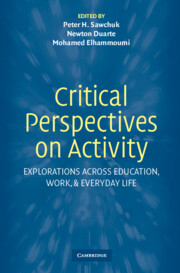Book contents
- Frontmatter
- Contents
- List of Contributors
- Foreword by Seth Chaiklin
- Acknowledgements
- 1 Introduction: Exploring Activity Across Education, Work, and Everyday Life
- SECTION I CRITICAL PERSPECTIVES ON THEORY
- SECTION II EDUCATION
- SECTION III WORK
- SECTION IV EVERYDAY LIFE
- 11 Education as Mediation Between the Individual's Everyday Life and the Historical Construction of Society and Culture by Humankind
- 12 Activity and Power: Everyday Life and Development of Working-Class Groups
- References
- Index
11 - Education as Mediation Between the Individual's Everyday Life and the Historical Construction of Society and Culture by Humankind
Published online by Cambridge University Press: 10 December 2009
- Frontmatter
- Contents
- List of Contributors
- Foreword by Seth Chaiklin
- Acknowledgements
- 1 Introduction: Exploring Activity Across Education, Work, and Everyday Life
- SECTION I CRITICAL PERSPECTIVES ON THEORY
- SECTION II EDUCATION
- SECTION III WORK
- SECTION IV EVERYDAY LIFE
- 11 Education as Mediation Between the Individual's Everyday Life and the Historical Construction of Society and Culture by Humankind
- 12 Activity and Power: Everyday Life and Development of Working-Class Groups
- References
- Index
Summary
What is man? This is the primary and principal question that philosophy asks. How is it to be answered? (…) Reflecting on it, we can see that in putting the question “what is man” what we mean is: what can man become? That is, can man dominate his own destiny, can he “make himself,” can he create his own life?
(Gramsci, 1978)INTRODUCTION
Since the later 1980s, I have been undertaking study and research directed at the elaboration of a Marxist theory of education. These studies encompass works written by Marx himself as well as by more contemporary authors and include a wide range of fields of knowledge, from philosophy to psychology, passing through sociology, history, and economy (Duarte, 1993, 1996, 2000a, 2000b, 2000c, 2002a, 2002b, 2003a, 2003b, 2003c). In these studies, I have touched upon a complex set of mediations that connect the critical analysis of contemporary capitalist social reality to the debates in the field of pedagogical ideas. However, taking into account the limited space of a chapter, it will not be possible to approach here this complex set of mediations. Some simplification will become inescapable and providing a somewhat schematic character in my argumentation. Being conscious of the limits of this chapter, I have proposed the task of holding here the position on an articulation between activity theory and the theory of everyday life from the point of view of Karl Marx's philosophical anthropology.
- Type
- Chapter
- Information
- Critical Perspectives on ActivityExplorations Across Education, Work, and Everyday Life, pp. 211 - 237Publisher: Cambridge University PressPrint publication year: 2006
- 1
- Cited by

